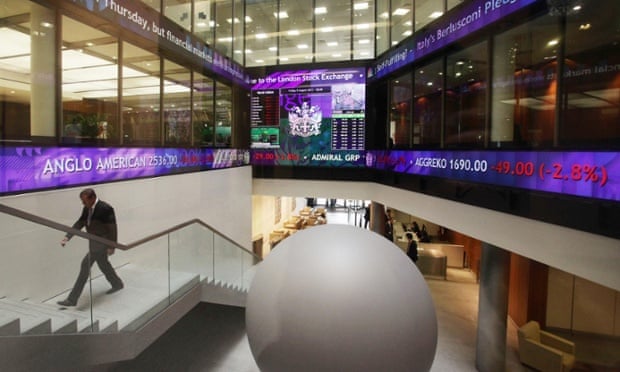
The FTSE 100 has soared through the 7,000 barrier for the first time in its history, with investors buoyed by the prospect of continuing low interest rates and growing hopes that a solution may finally be found to Greece’s financial crisis.
Seventeen years after the leading index hit 6,000, it finally added the next 1,000 points after a number of attempts, notably in 1999 at the height of the dotcom boom. Last year there were predictions that the index would reach new peaks, but after coming close a number of times, it always fell at the final hurdle as new risks – ebola, the Ukraine crisis, the eurozone – emerged. But on Friday, it closed 60.19 points higher at a record 7,022.51, a near-1% rise on the day.
The initial impetus came after a late-night European summit on Thursday, when Greece’s eurozone creditors agreed to provide more funding if the country drew up a list of reforms as soon as possible. The more positive tone eased fears that Greece would be forced out of the eurozone, causing a new financial crisis for the global economy. An opening rise on Wall Street as fears of a US interest rate rise eased gave the final push to UK shares.
Markets have been supported for months by central banks’ policy of low interest rates and pumping money into the financial system, with the European Central Bank starting its own quantitative easing programme earlier this month.
But there had been some nervousness that with signs of the US economyimproving, the Federal Reserve would soon begin raising interest rates. However, Fed chief Janet Yellen this week signalled a slower path for interest rate rises in the world’s biggest economy. The Washington-based central bank indicated that while there might still be a rise in the cost of credit this year in response to some strong economic figures, interest rates would remain at modest levels for several years.
Trevor Green, head of Institutional Equities at Aviva Investors, said: “Investors took comfort from the fact that interest rates in the US and UK look unlikely to rise any time soon. Lower oil prices in particular are helping to improve consumer discretionary income which should feed back into higher spending. The ECB may well have been late to start quantitative easing, but ironically its arrival coincides with improving eurozone economic data. As our primary trade partner, this is good news for earnings for those exposed to the region.”
George Osborne’s budget on Wednesday was also well received by investors, with benefits for savers and help for businesses. The London market was helped by a revival in mining shares as commodity prices recovered some ground, lifted by a weaker dollar following the Fed meeting and news that Chinese inventories had fallen, a positive sign for the outlook for future demand.
Risers included Irish cement firm CRH, which surged on expectations of a lucrative deal to pick up assets jettisoned from the Holcim-Lafarge merger. There was also takeover news, with TSB agreeing a £1.7bn takeover by Spanish lender Banco Sabadell in one of the biggest cross-border banking deals since the financial crisis of 2007-09.
But there was some uncertainty about the outlook for equities after their record breaking run. Fund manager Peter Cameron at Ecclesiastical Investment Management said: “Unlike when the market was gripped by an irrational technology bubble, this new high should not cause alarm amongst investors. A backdrop of inflation tailwinds from declining food and fuel prices, falling unemployment and signs of wage growth finally returning, create a benign outlook for the UK economy in 2015. Improving economic activity within the eurozone, our largest trading partner, will also act as a tailwind, as should recent comments from the Bank of England which indicate interest rates may stay lower for even longer than investors expect. “
But Chris Williams, chief executive of Wealth Horizon, said: “The FTSE 100 finally breached 7,000 having already set numerous record highs in 2015. While this is great news for investors in UK equities, it presents a conundrum for what comes next. Certainly, no one can say equities look like a bargain at these levels, so the key for investors is to diversify their exposure and make sure they are not taking too much risk on any one market.”
The forthcoming general election in the UK could also cause some volatility in the coming weeks.